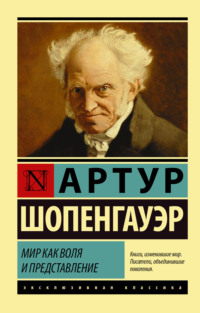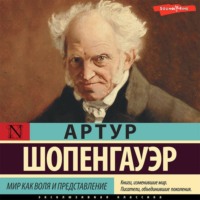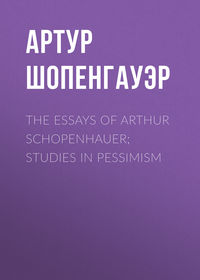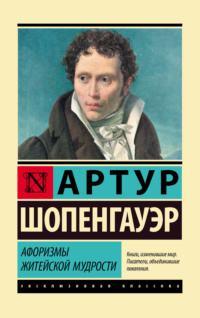 полная версия
полная версияThe Essays of Arthur Schopenhauer; Counsels and Maxims
In a young man, it is a bad sign, as well from an intellectual as from a moral point of view, if he is precocious in understanding the ways of the world, and in adapting himself to its pursuits; if he at once knows how to deal with men, and enters upon life, as it were, fully prepared. It argues a vulgar nature. On the other hand, to be surprised and astonished at the way people act, and to be clumsy and cross-grained in having to do with them, indicates a character of the nobler sort.
The cheerfulness and vivacity of youth are partly due to the fact that, when we are ascending the hill of life, death is not visible: it lies down at the bottom of the other side. But once we have crossed the top of the hill, death comes in view – death – which, until then, was known to us only by hearsay. This makes our spirits droop, for at the same time we begin to feel that our vital powers are on the ebb. A grave seriousness now takes the place of that early extravagance of spirit; and the change is noticeable even in the expression of a man's face. As long as we are young, people may tell us what they please! we look upon life as endless and use our time recklessly; but the older we become, the more we practice economy. For towards the close of life, every day we live gives us the same kind of sensation as the criminal experiences at every step on his way to be tried.
From the standpoint of youth, life seems to stretch away into an endless future; from the standpoint of old age, to go back but a little way into the past; so that, at the beginning, life presents us with a picture in which the objects appear a great way off, as though we had reversed our telescope; while in the end everything seems so close. To see how short life is, a man must have grown old, that is to say, he must have lived long.
On the other hand, as the years increase, things look smaller, one and all; and Life, which had so firm and stable a base in the days of our youth, now seems nothing but a rapid flight of moments, every one of them illusory: we have come to see that the whole world is vanity!
Time itself seems to go at a much slower pace when we are young; so that not only is the first quarter of life the happiest, it is also the longest of all; it leaves more memories behind it. If a man were put to it, he could tell you more out of the first quarter of his life than out of two of the remaining periods. Nay, in the spring of life, as in the spring of the year, the days reach a length that is positively tiresome; but in the autumn, whether of the year or of life, though they are short, they are more genial and uniform.
But why is it that to an old man his past life appears so short? For this reason: his memory is short; and so he fancies that his life has been short too. He no longer remembers the insignificant parts of it, and much that was unpleasant is now forgotten; how little, then, there is left! For, in general, a man's memory is as imperfect as his intellect; and he must make a practice of reflecting upon the lessons he has learned and the events he has experienced, if he does not want them both to sink gradually into the gulf of oblivion. Now, we are unaccustomed to reflect upon matters of no importance, or, as a rule, upon things that we have found disagreeable, and yet that is necessary if the memory of them is to be preserved. But the class of things that may be called insignificant is continually receiving fresh additions: much that wears an air of importance at first, gradually becomes of no consequence at all from the fact of its frequent repetition; so that in the end we actually lose count of the number of times it happens. Hence we are better able to remember the events of our early than of our later years. The longer we live, the fewer are the things that we can call important or significant enough to deserve further consideration, and by this alone can they be fixed in the memory; in other words, they are forgotten as soon as they are past. Thus it is that time runs on, leaving always fewer traces of its passage.
Further, if disagreeable things have happened to us, we do not care to ruminate upon them, least of all when they touch our vanity, as is usually the case; for few misfortunes fall upon us for which we can be held entirely blameless. So people are very ready to forget many things that are disagreeable, as well as many that are unimportant.
It is from this double cause that our memory is so short; and a man's recollection of what has happened always becomes proportionately shorter, the more things that have occupied him in life. The things we did in years gone by, the events that happened long ago, are like those objects on the coast which, to the seafarer on his outward voyage, become smaller every minute, more unrecognizable and harder to distinguish.
Again, it sometimes happens that memory and imagination will call up some long past scene as vividly as if it had occurred only yesterday; so that the event in question seems to stand very near to the present time. The reason of this is that it is impossible to call up all the intervening period in the same vivid way, as there is no one figure pervading it which can be taken in at a glance; and besides, most of the things that happened in that period are forgotten, and all that remains of it is the general knowledge that we have lived through it – a mere notion of abstract existence, not a direct vision of some particular experience. It is this that causes some single event of long ago to appear as though it took place but yesterday: the intervening time vanishes, and the whole of life looks incredibly short. Nay, there are occasional moments in old age when we can scarcely believe that we are so advanced in years, or that the long past lying behind us has had any real existence – a feeling which is mainly due to the circumstance that the present always seems fixed and immovable as we look at it. These and similar mental phenomena are ultimately to be traced to the fact that it is not our nature in itself, but only the outward presentation of it, that lies in time, and that the present is the point of contact between the world as subject and the world as object.66
Again, why is it that in youth we can see no end to the years that seem to lie before us? Because we are obliged to find room for all the things we hope to attain in life. We cram the years so full of projects that if we were to try and carry them all out, death would come prematurely though we reached the age of Methuselah.
Another reason why life looks so long when we are young, is that we are apt to measure its length by the few years we have already lived. In those early years things are new to us, and so they appear important; we dwell upon them after they have happened and often call them to mind; and thus in youth life seems replete with incident, and therefore of long duration.
Sometimes we credit ourselves with a longing to be in some distant spot, whereas, in truth, we are only longing to have the time back again which we spent there – days when we were younger and fresher than we are now. In those moments Time mocks us by wearing the mask of space; and if we travel to the spot, we can see how much we have been deceived.
There are two ways of reaching a great age, both of which presuppose a sound constitution as a conditio sine quâ non. They may be illustrated by two lamps, one of which burns a long time with very little oil, because it has a very thin wick; and the other just as long, though it has a very thick one, because there is plenty of oil to feed it. Here, the oil is the vital energy, and the difference in the wick is the manifold way in which the vital energy is used.
Up to our thirty-sixth year, we may be compared, in respect of the way in which we use our vital energy, to people who live on the interest of their money: what they spend to-day, they have again to-morrow. But from the age of thirty-six onwards, our position is like that of the investor who begins to entrench upon his capital. At first he hardly notices any difference at all, as the greater part of his expenses is covered by the interest of his securities; and if the deficit is but slight, he pays no attention to it. But the deficit goes on increasing, until he awakes to the fact that it is becoming more serious every day: his position becomes less and less secure, and he feels himself growing poorer and poorer, while he has no expectation of this drain upon his resources coming to an end. His fall from wealth to poverty becomes faster every moment – like the fall of a solid body in space, until at last he has absolutely nothing left. A man is truly in a woeful plight if both the terms of this comparison – his vital energy and his wealth – really begin to melt away at one and the same time. It is the dread of this calamity that makes love of possession increase with age.
On the other hand, at the beginning of life, in the years before we attain majority, and for some little time afterwards – the state of our vital energy puts us on a level with those who each year lay by a part of their interest and add it to their capital: in other words, not only does their interest come in regularly, but the capital is constantly receiving additions. This happy condition of affairs is sometimes brought about – with health as with money – under the watchful care of some honest guardian. O happy youth, and sad old age!
Nevertheless, a man should economize his strength even when he is young. Aristotle67 observes that amongst those who were victors at Olympia only two or three gained a prize at two different periods, once in boyhood and then again when they came to be men; and the reason of this was that the premature efforts which the training involved, so completely exhausted their powers that they failed to last on into manhood. As this is true of muscular, so it is still more true of nervous energy, of which all intellectual achievements are the manifestation. Hence, those infant prodigies —ingenia praecoda– the fruit of a hot-house education, who surprise us by their cleverness as children, afterwards turn out very ordinary folk. Nay, the manner in which boys are forced into an early acquaintance with the ancient tongues may, perhaps, be to blame for the dullness and lack of judgment which distinguish so many learned persons.
I have said that almost every man's character seems to be specially suited to some one period of life, so that on reaching it the man is at his best. Some people are charming so long as they are young, and afterwards there is nothing attractive about them; others are vigorous and active in manhood, and then lose all the value they possess as they advance in years; many appear to best advantage in old age, when their character assumes a gentler tone, as becomes men who have seen the world and take life easily. This is often the case with the French.
This peculiarity must be due to the fact that the man's character has something in it akin to the qualities of youth or manhood or old age – something which accords with one or another of these periods of life, or perhaps acts as a corrective to its special failings.
The mariner observes the progress he makes only by the way in which objects on the coast fade away into the distance and apparently decrease in size. In the same way a man becomes conscious that he is advancing in years when he finds that people older than himself begin to seem young to him.
It has already been remarked that the older a man becomes, the fewer are the traces left in his mind by all that he sees, does or experiences, and the cause of this has been explained. There is thus a sense in which it may be said that it is only in youth that a man lives with a full degree of consciousness, and that he is only half alive when he is old. As the years advance, his consciousness of what goes on about him dwindles, and the things of life hurry by without making any impression upon him, just as none is made by a work of art seen for the thousandth time. A man does what his hand finds to do, and afterwards he does not know whether he has done it or not.
As life becomes more and more unconscious, the nearer it approaches the point at which all consciousness ceases, the course of time itself seems to increase in rapidity. In childhood all the things and circumstances of life are novel; and that is sufficient to awake us to the full consciousness of existence: hence, at that age, the day seems of such immense length. The same thing happens when we are traveling: one month seems longer then than four spent at home. Still, though time seems to last longer when we are young or on a journey, the sense of novelty does not prevent it from now and then in reality hanging heavily upon our hands under both these circumstances, at any rate more than is the case when we are old or staying at home. But the intellect gradually becomes so rubbed down and blunted by long habituation to such impressions that things have a constant tendency to produce less and less impression upon us as they pass by; and this makes time seem increasingly less important, and therefore shorter in duration: the hours of the boy are longer than the days of the old man. Accordingly, time goes faster and faster the longer we live, like a ball rolling down a hill. Or, to take another example: as in a revolving disc, the further a point lies from the centre, the more rapid is its rate of progression, so it is in the wheel of life; the further you stand from the beginning, the faster time moves for you. Hence it may be said that as far as concerns the immediate sensation that time makes upon our minds, the length of any given year is in direct proportion to the number of times it will divide our whole life: for instance, at the age of fifty the year appears to us only one-tenth as long as it did at the age of five.
This variation in the rate at which time appears to move, exercises a most decided influence upon the whole nature of our existence at every period of it. First of all, it causes childhood – even though it embrace only a span of fifteen years – to seem the longest period of life, and therefore the richest in reminiscences. Next, it brings it about that a man is apt to be bored just in proportion as he is young. Consider, for instance, that constant need of occupation – whether it is work or play – that is shown by children: if they come to an end of both work and play, a terrible feeling of boredom ensues. Even in youth people are by no means free from this tendency, and dread the hours when they have nothing to do. As manhood approaches, boredom disappears; and old men find the time too short when their days fly past them like arrows from a bow. Of course, I must be understood to speak of men, not of decrepit brutes. With this increased rapidity of time, boredom mostly passes away as we advance in life; and as the passions with all their attendant pain are then laid asleep, the burden of life is, on the whole, appreciably lighter in later years than in youth, provided, of course, that health remains. So it is that the period immediately preceding the weakness and troubles of old age, receives the name of a man's best years.
That may be a true appellation, in view of the comfortable feeling which those years bring; but for all that the years of youth, when our consciousness is lively and open to every sort of impression, have this privilege – that then the seeds are sown and the buds come forth; it is the springtime of the mind. Deep truths may be perceived, but can never be excogitated – that is to say, the first knowledge of them is immediate, called forth by some momentary impression. This knowledge is of such a kind as to be attainable only when the impressions are strong, lively and deep; and if we are to be acquainted with deep truths, everything depends upon a proper use of our early years. In later life, we may be better able to work upon other people, – upon the world, because our natures are then finished and rounded off, and no more a prey to fresh views; but then the world is less able to work upon us. These are the years of action and achievement; while youth is the time for forming fundamental conceptions, and laying down the ground-work of thought.
In youth it is the outward aspect of things that most engages us; while in age, thought or reflection is the predominating quality of the mind. Hence, youth is the time for poetry, and age is more inclined to philosophy. In practical affairs it is the same: a man shapes his resolutions in youth more by the impression that the outward world makes upon him; whereas, when he is old, it is thought that determines his actions. This is partly to be explained by the fact that it is only when a man is old that the results of outward observation are present in sufficient numbers to allow of their being classified according to the ideas they represent, – a process which in its turn causes those ideas to be more fully understood in all their bearings, and the exact value and amount of trust to be placed in them, fixed and determined; while at the same time he has grown accustomed to the impressions produced by the various phenomena of life, and their effects on him are no longer what they were. Contrarily, in youth, the impressions that things make, that is to say, the outward aspects of life, are so overpoweringly strong, especially in the case of people of lively and imaginative disposition, that they view the world like a picture; and their chief concern is the figure they cut in it, the appearance they present; nay, they are unaware of the extent to which this is the case. It is a quality of mind that shows itself – if in no other way – in that personal vanity, and that love of fine clothes, which distinguish young people.
There can be no doubt that the intellectual powers are most capable of enduring great and sustained efforts in youth, up to the age of thirty-five at latest; from which period their strength begins to decline, though very gradually. Still, the later years of life, and even old age itself, are not without their intellectual compensation. It is only then that a man can be said to be really rich in experience or in learning; he has then had time and opportunity enough to enable him to see and think over life from all its sides; he has been able to compare one thing with another, and to discover points of contact and connecting links, so that only then are the true relations of things rightly understood. Further, in old age there comes an increased depth in the knowledge that was acquired in youth; a man has now many more illustrations of any ideas he may have attained; things which he thought he knew when he was young, he now knows in reality. And besides, his range of knowledge is wider; and in whatever direction it extends, it is thorough, and therefore formed into a consistent and connected whole; whereas in youth knowledge is always defective and fragmentary.
A complete and adequate notion of life can never be attained by any one who does not reach old age; for it is only the old man who sees life whole and knows its natural course; it is only he who is acquainted – and this is most important – not only with its entrance, like the rest of mankind, but with its exit too; so that he alone has a full sense of its utter vanity; whilst the others never cease to labor under the false notion that everything will come right in the end.
On the other hand, there is more conceptive power in youth, and at that time of life a man can make more out of the little that he knows. In age, judgment, penetration and thoroughness predominate. Youth is the time for amassing the material for a knowledge of the world that shall be distinctive and peculiar, – for an original view of life, in other words, the legacy that a man of genius leaves to his fellow-men; it is, however, only in later years that he becomes master of his material. Accordingly it will be found that, as a rule, a great writer gives his best work to the world when he is about fifty years of age. But though the tree of knowledge must reach its full height before it can bear fruit, the roots of it lie in youth.
Every generation, no matter how paltry its character, thinks itself much wiser than the one immediately preceding it, let alone those that are more remote. It is just the same with the different periods in a man's life; and yet often, in the one case no less than in the other, it is a mistaken opinion. In the years of physical growth, when our powers of mind and our stores of knowledge are receiving daily additions, it becomes a habit for to-day to look down with contempt upon yesterday. The habit strikes root, and remains even after the intellectual powers have begun to decline, – when to-day should rather look up with respect to yesterday. So it is that we often unduly depreciate the achievements as well as the judgments of our youth. This seems the place for making the general observation, that, although in its main qualities a man's intellect or head, as well as his character or heart, is innate, yet the former is by no means so unalterable in its nature as the latter. The fact is that the intellect is subject to very many transformations, which, as a rule, do not fail to make their actual appearance; and this is so, partly because the intellect has a deep foundation in the physique, and partly because the material with which it deals is given in experience. And so, from a physical point of view, we find that if a man has any peculiar power, it first gradually increases in strength until it reaches its acme, after which it enters upon a path of slow decadence, until it ends in imbecility. But, on the other hand, we must not lose sight of the fact that the material which gives employment to a man's powers and keeps them in activity, – the subject-matter of thought and knowledge, experience, intellectual attainments, the practice of seeing to the bottom of things, and so a perfect mental vision, form in themselves a mass which continues to increase in size, until the time comes when weakness shows itself, and the man's powers suddenly fail. The way in which these two distinguishable elements combine in the same nature, – the one absolutely unalterable, and the other subject to change in two directions opposed to each other – explains the variety of mental attitude and the dissimilarity of value which attach to a man at different periods of life.
The same truth may be more broadly expressed by saying that the first forty years of life furnish the text, while the remaining thirty supply the commentary; and that without the commentary we are unable to understand aright the true sense and coherence of the text, together with the moral it contains and all the subtle application of which it admits.
Towards the close of life, much the same thing happens as at the end of a bal masqué– the masks are taken off. Then you can see who the people really are, with whom you have come into contact in your passage through the world. For by the end of life characters have come out in their true light, actions have borne fruit, achievements have been rightly appreciated, and all shams have fallen to pieces. For this, Time was in every case requisite.
But the most curious fact is that it is also only towards the close of life than a man really recognizes and understands his own true self, – the aims and objects he has followed in life, more especially the kind of relation in which he has stood to other people and to the world. It will often happen that as a result of this knowledge, a man will have to assign himself a lower place than he formerly thought was his due. But there are exceptions to this rule; and it will occasionally be the case that he will take a higher position than he had before. This will be owing to the fact that he had no adequate notion of the baseness of the world, and that he set up a higher aim for himself than was followed by the rest of mankind.
The progress of life shows a man the stuff of which he is made.
It is customary to call youth the happy, and age the sad part of life. This would be true if it were the passions that made a man happy. Youth is swayed to and fro by them; and they give a great deal of pain and little pleasure. In age the passions cool and leave a man at rest, and then forthwith his mind takes a contemplative tone; the intellect is set free and attains the upper hand. And since, in itself, intellect is beyond the range of pain, and man feels happy just in so far as his intellect is the predominating part of him.









